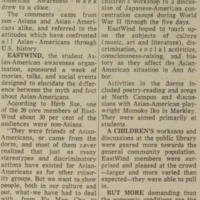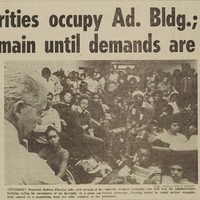A/PIA Activism in Michigan Before Chin
Asian Americans have a long, complex history at the University of Michigan, particularly with the university’s involvement in the colonization of the Philippines through Dean C. Worcester’s zoological expeditions and eventual administrative rule. The first Filipino students arrived to the campus in 1900 as a result of the Pensionado Act, which aimed to immerse native Filipinos in the American thought so they can participate in public service in the Philippines (Michigan Daily, September 29, 1900). With their presence, the debates surrounding imperialism and anti-imperialist sentiment grew on campus, with multiple conversations being covered through the Michigan Daily (Michigan Daily, March 2, 1899 & October 23, 1899). They later created the Filipino-Michigan Club. This organization regularly held Philippine culture nights and events for the international student population. Additionally, Asian international students in the early 1900s created the Cosmopolitan Club, which aimed to be an umbrella organization for the international student populations on campus.
At the University of Michigan, there were two prominent organizations that centered Asian American interests during the 1970s: Third World Coalition (TWC) and East Wind. The Third World Coalition was a group formed at the University of Michigan in the 1970s in order to establish a group of students comprised of blacks, Asian-Americans, Native Americans, and Latinos. They advocated for the inclusion of minorities within paid administration roles, specifically for an Asian American advocate, and to put an end to the perceived racist policies at the University (Michigan Daily). TWC was most well known for the 3 day occupation of the president’s building in February 1975 to have their demands of the administration met. East Wind, on the other hand, was a student Asian American awareness organization working to dispel the “model minority image.” They sponsored Asian Awareness week where they had film screenings, talks and social events aimed to differentiate between myths and facts about Asian peoples and cultures. They also hosted children’s workshops on Asian culture and community discussions about topics concerning the model minority myth and Asian American experiences. East Wind is now known as the Asian American Organization at University of Michigan.
References
Filipinos in School. Michigan Daily. September 29, 1900. https://digital.bentley.umich.edu/midaily/mdp.39015071730803/35
Defends Imperialism. March 2, 1899. Volume 9, Issue 111. Michigan Daily. https://digital.bentley.umich.edu/midaily/mdp.39015071730670/451
For Imperialism. October 23, 1899. Volume 10, Issue 25. Michigan Daily. https://digital.bentley.umich.edu/midaily/mdp.39015071730795/105
Michigan Daily. “Groups fight Asian American Stereotypes.” September 8, 1988. (Vol. 99, Issue 1)


